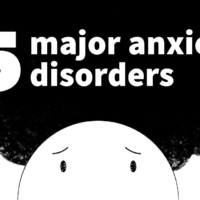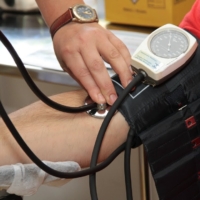6 Signs Of Schizophrenia
(bright music) – [Lily] Hi, Psych2Goers, and welcome back to another video. Thank you so much for
your love and support, enabling us to make
yet another exploration into everyday psychology
and mental health. So let’s begin. When you think of schizophrenia, what comes to mind? Does having multiple
or split personalities make a schizophrenic? The Diagnostic and Statistical Manual of Psychiatric Disorders, also known as DSM-5, defines schizophrenia as a mental disorder consisting of a constellation of symptoms such as delusions, hallucinations, disorganized thinking,
and abnormal behaviors. No single symptom alone is characteristic of the disorder and people exhibit different symptoms. Today, we will be discussing six signs of schizophrenia. But before we begin, please remember this video is for educational purposes only. Do not use this information
to self-diagnose. We encourage you to seek professional help from a psychiatrist or
other health professionals. One is delusions. Do you know of someone who believes they will be harmed by
an individual or group, even though without evidence? This is an example of
a persecutory delusion.
What about someone who believes they’re the richest person in the world? Grandiose delusions are exactly that. Delusions are beliefs that do not change, even when there is clear
conflicting evidence present. Other types of delusions are referential delusions such as, “The trees are telling me something,” or nihilistic delusions such as, “The world is ending,” and somatic delusions such as, “There’s something wrong with my body, “even when my doctor disagreed.” Two, hallucinations. Have you ever heard someone hearing voices that seem so very real to them occurring outside their thoughts? These are auditory hallucinations, which are the most
common in schizophrenia. Hallucinations are experiences that happen when there is no external stimulus. Hallucinations can also be visual, which is the case if you see something that
is not there.
However, hallucinations
can be a normal part of religious experiences, and having hallucinations
without other symptoms does not mean that you have schizophrenia. Three, disorganized speech. Have you seen someone constantly switching from one topic to another, especially when there is no obvious connection between the topics? Such is the identity
of disorganized speech. Sometimes it can be so incomprehensible that others cannot
understand what is going on. Another case of disorganized
speech is tangentiality, which is when someone
just goes off on tangents. Four, abnormal movements
or motor behaviors. Catatonic behavior is a marked decrease in environmental reactivity. And catatonia is a group of symptoms that usually involve a lack of movement and communication, and can also include agitation, confusion, and restlessness. Common catatonic behaviors include showing reduced responsiveness to the environment that lasts for hours or even days, performing strange movements, and staying in uncomfortable
positions without shifting. They may echo their speech, have difficulty speaking, or have erratic and extreme movements. The opposite can also occur. Someone can move so much
without a clear goal, which is called catatonic excitement.
However, catatonia, like hallucinations, can be a symptom of other mental disorders like bipolar disorder or major depressive
disorder with catatonia. Five decreased emotional expression. Do you know of someone who shows diminished emotional expression? Do they sound very monotone, like a robot, and appear very stiff when they stand compared to the relaxed position that we usually expect? When we speak, it’s typical that we
display facial expressions that show how we feel. A sign of schizophrenia is a lack of emotional expression that is typically expected.
Other symptoms that are
signs of schizophrenia include avolition, which means a lack of motivation to do anything; alogia, which means less speech output; And asociality when someone shows no interest in social interactions. Six, memory problems. According to J. Daniel Ragland, professor of psychiatry at the UC Davis School of Medicine, people with schizophrenia have difficulty retrieving associations within a context. This creates a pervasive loss of memory that makes everyday life a challenge. For example, you can’t work if you can’t remember the steps in what your boss told you to do. Memory troubles are caused by the dysfunctional frontal and temporal lobe regions in the brain. We hope we were able to
give you some insight into the different signs of schizophrenia. Do you now understand the
six signs of schizophrenia? Do you know someone who may exhibit some of these symptoms of schizophrenia? Let us know in the comments below. If you find this video helpful, be sure to hit the like
and subscribe button, and share it with someone who might benefit from it. Don’t forget to hit the
notification bell icon to get notified whenever Psych2Go posts a new video.
As always, thanks for watching.
Use VNDT5OFF for $5 OFF Guaranteed for minimum of… ᴠɪᴅᴇɴᴛʟʏ ᵇʸ ᵉˣᵖˡᵃᶦⁿᵈᶦᵒ ʳᵉᵛᵒˡᵘᵗᶦᵒⁿᶦᶻᵉ ʸᵒᵘʳ ᵛᶦᵈᵉᵒˢ ʷᶦᵗʰ ˢʷᶦᵖᵉ & ˢⁿᵃᵖ: ᵉᶠᶠᵒʳᵗˡᵉˢˢˡʸ ᶜʳᵉᵃᵗᵉ ᶜᵒⁿᵗᵉⁿᵗ ᵗʰᵃᵗ ᵉⁿᵍᵃᵍᵉˢ & ˢᵉˡˡˢ ʷᶦᵗʰ ᵃᶦ⁻ᵖᵒʷᵉʳᵉᵈ ˢᶜʳᶦᵖᵗˢ ᵘⁿˡᵒᶜᵏ ᵗʰᵉ ᶠᵘˡˡ ᵖᵒᵗᵉⁿᵗᶦᵃˡ ᵒᶠ ᵛᶦᵈᵉᵒ ᵐᵃʳᵏᵉᵗᶦⁿᵍ: ᵗʰᵉ ᵒⁿˡʸ ˢᵒᶠᵗʷᵃʳᵉ ʷᶦᵗʰ ˢʷᶦᵖᵉ & ˢⁿᵃᵖ ᵉᵃˢᵉ ᵃⁿᵈ ᵃᶦ ˢᶜʳᶦᵖᵗ ᵍᵉⁿᶦᵘˢ—ᵗʳᵃⁿˢᶠᵒʳᵐ ᵛᶦᵉʷˢ ᶦⁿᵗᵒ ᵛᵃˡᵘᵉ ᵃⁿᵈ ᵛᶦˢᶦᵗᵒʳˢ ᶦⁿᵗᵒ ᵇᵘʸᵉʳˢ.
















